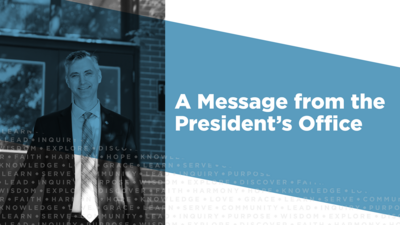Why do we need more Lutheran higher education institutions nationwide than we have today?

Multiple studies over the past decade indicate that between 60% and 70% of 18- to 28-year-old Christians are leaving the church. Various studies give respondent reasons, but there is a battle for the mind, and we lose countless during college years.
According to one survey, only 6% of university professors say that the Bible is the Word of God (not even the inspired and inerrant Word of God, just the Word of God in some form). In addition, university professors are four times more likely to be atheist or agnostic than the general public in the United States. Contrast that to Lutheran Church—Missouri Synod universities where all faculty members must be Christian (we are between 85% and 90% LCMS faculty at Concordia Nebraska). Are the Concordia faculty perfect? No. Are 94% of them denying the Bible as the Word of God, as you find in the larger world of higher education? No. And that matters for the faith formation of college students.
Among other things, vocational and disciplinary discipleship/catechesis is essential to address the intellectual questions that breed seeds of doubt, namely Christian scholars/mentors in a student’s field of study (history, English, pre-med, pre-law, business, physics, psychology, classics, philosophy, engineering, education, you name it.). Even if students get involved in a campus ministry at a secular or near-secular private university, they rarely get Christian scholars/mentors in their discipline and other courses.
This generation of young people tends to select a college closer to home at a higher rate, meaning that serving even a modest percent of students from LCMS churches and high schools requires having campuses in different parts of the country. Add the value of serving graduates of Lutheran high schools in various parts of the country and being a faithful witness to others outside of the church and this means having campuses in different geographic regions.
Decrease the number of students who attend a Concordia, and you will decrease the number of church workers in the LCMS. We already have a shortage.
If only 20% of high school seniors from LCMS congregations went to a Concordia each year, and only 10% of graduates from Lutheran high schools went to a Concordia each year, combined with the expected enrollment of other students geographically close to each campus—then every existing Concordia would be at record enrollment, so full that they would need to create a waiting list, build new dorms or both. Yet, we are not there—not yet. Many LCMS pastors and parents mistake today’s higher education with what it was like ten or twenty years ago, not realizing the massive changes and spiritual impact of where one chooses to attend college. Or, they think that their students are somehow immune to influences. They are not.
These are a few reasons why every current Concordia campus is valuable and why we should start thinking about launching more of them. I have a draft concept of how we could potentially be at close to 30 LCMS higher education institutions (4-year, 2-year, and specialty schools), each faithful and flourishing—with solid enrollment and on sound financial footing, within the next twenty years. We are closer to achieving this than some realize, especially if you consider that many Lutheran high schools graduate students with 1-2 years of college credit today.
Our Concordias are such a blessing, and I’m honored to serve at one of them—even as I strive to champion the gift and importance of Lutheran education of all levels, locations and formats.
There are challenges: raising and finding faithful faculty and staff, growing endowments and building sustainable financial models, navigating influences from government and regulatory agencies, etc. These are challenges but not insurmountable. The work is not easy, and success is not guaranteed, but it is achievable. Given everything I wrote above, it is worth the effort, even knowing there will be setbacks and disappointments.
Related Stories


